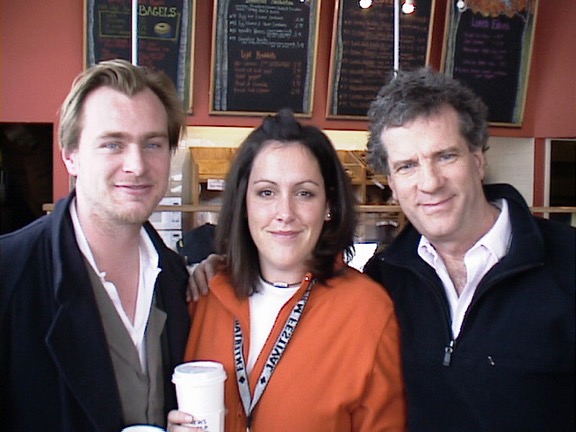THE DISTRIBUTION BULLETIN ISSUE #21
Film festivals can help or harm your film. Mistakes can cripple its launch and limit its distribution, including applying to festivals too early, targeting the wrong festivals, not having the right festival team, and making bad distribution deals.
A customized distribution strategy enables filmmakers to make the most of festivals (the first avenue of distribution), choose the best distribution partners, and negotiate win-win deals.
While I was preparing to go to the Sundance Film Festival (the most influential American festival) and speaking with clients about their plans for the Festival, Thom Powers (who programs docs for the Toronto International Film Festival, and is the Artistic Director of the DOC NYC festival and the Stranger Than Fiction documentary series in New York City) asked me to contribute to a pre-Sundance compilation of advice for documentary filmmakers. His request inspired me to summarize my recommendations on festival and negotiating strategies. After I sent him my comments, I decided to expand them for this Distribution Bulletin. I’ve also included fiction features. Distribution strategies for documentaries and fiction overlap in many areas but differ in others.

A CUSTOMIZED STRATEGY
Every film can benefit from having a distribution strategy before its festival premiere and before any rights are sold. A customized strategy can help you maximize audience, revenues, impact, and career.
This strategy should be designed based on your goals, your film’s content, its core audiences, and the opportunities in key avenues of distribution (from theatrical and television to direct sales). If you have a customized strategy, you can look for distribution partners who can help you implement your strategy. If not, your film may receive a formulaic, one-size-fits-all release in which every film is distributed pretty much the same way.
Documentary filmmakers need to proactively design strategies, which will enable them to split their rights among partners. Educational sales and semi-theatrical screenings can be very important and you need partners for each who can help you fully exploit them. Partnerships with nonprofits are another significant element of a documentary’s distribution strategy.
GOALS
It is essential to be clear about the ultimate goals for your film when you design your strategy. You can have multiple goals but should prioritize them. What is most important: career? revenues? or changing the world? If you are clear about your goals, you will have a useful framework for making choices as you move through the stages of your distribution.
You also need to be clear about your festival goals. Your premiere festival launches your film into the world. It provides a unique opportunity to build awareness among:
- film critics, bloggers, and other members of the media
- distributors
- colleagues, executives, and others who can help with future films
- the general public
Your screenings will give an immediate sense of how audiences are responding and can create word-of-mouth within the festival. These screenings are an ideal place for distributors to see your film for the first time (even if they discount somewhat enthusiastic audience responses). Your film may also get its first reviews and press mentions. It could also receive festival awards and generate buzz online.
Most films are not sold at their first festival. While some distribution deals are made mid-festival, the majority of them happen weeks or months later. Distributors only attend a small number of festivals and there is little or no sales activity at the rest. Be well-prepared for sales opportunities but be realistic. Don’t focus on them to the exclusion of the need to market your film to the press, the industry, and regular viewers.
PUBLICITY
A publicist is essential at Sundance and recommended at certain other festivals where the media turns out in force. Your publicist will focus on critics and entertainment reporters and may be able to help with social media. Make sure your website and Facebook page are ready for prime time and that your team can execute a coordinated social media effort.
Your publicist can help you position your film, express what makes your film unique, and convey the passion with which you made it. You should have a trailer, a teaser, or at least a clip on your website and on Facebook, and it should be easily shareable online.

AGENTS AND REPS
Separate your rights into two categories: North American and international.
Having a producer’s rep sell North American rights may or may not be necessary. You may have a teammate (producer, consultant, attorney) with distribution expertise who can help you field offers and negotiate deals.
If you decide to hire a producer’s rep, he or she should be on board for your first domestic festival. Look for one who can help you implement your distribution strategy and who comes highly recommended by other filmmakers. If you find an excellent producer’s rep, decide which North American rights you want them to sell, and which you want to retain (see below). Your rep should make clear to potential distributors exactly which rights are available (excluding those you are retaining) before negotiations begin.
Having an international sales agent sell rights outside North America is essential but you don’t need to hire one before your first domestic festivals. You should retain the rights to sell DVDs, downloads, and streams from your website worldwide (excluding any territories where your sales agent makes exclusive deals for these rights).
Documentary filmmakers should select an international sales agent who specializes in TV sales and always attends MIP and MIPCOM. Have them handle your international digital rights only if they have a track record selling these rights successfully.
HYBRID DISTRIBUTION
Hybrid distribution is the alternative to giving one company total distribution control of your film for many years. It means splitting your rights among distribution partners, while retaining the ability to sell DVDs and downloads directly from your website.
Documentary filmmakers (and some fiction filmmakers) should consider making hybrid distribution Plan A, with Plan B being making a more traditional deal with one company. The hybrid approach enables you to choose the best partners for key avenues of distribution. Splitting up rights will make it possible to implement a customized strategy, refining it step-by-step. It also increases your chances of building a long life for your film.
DUE DILIGENCE
For some films a more traditional deal may be the best option. However favorable the deal terms, make sure the distributor can do a great job with your film. The best source of information is other filmmakers whose films have been distributed by that company. They will tell you off-the-record how effective and collaborative the company is, as well as how reliably they report and pay. Do not make a deal without doing serious research. While there will be limited time to do this if you are making a deal at a festival, most deals will be made after the festival, with ample time for due diligence.
Remember, no deal is better than a bad deal.
RIGHTS TO RETAIN
All filmmakers should try to retain (whether you make a multiple rights deal or split up your rights):
Direct Digital – the rights to sell downloads and streams directly from your website
Direct DVD – the rights to sell DVDs from your website and at screenings. This needs to be coupled with the right to buy DVDs from your DVD distributor at cost or no more than $5.00
The distributor will have all retail DVD and digital rights, allowing them to make deals with Amazon, iTunes, Netflix, Hulu, and other companies and to sell directly from their websites. Your right to sell from your website will complement their rights. In many cases allowing filmmakers to sell from their websites has incentivized them to promote their films extensively through social media. This has increased retail sales, benefiting both the distributor and the filmmakers.
Documentary filmmakers who make a multiple rights deal with one distributor should also retain:
Educational – the rights to sell educational copies to colleges and universities, high schools, libraries, nonprofits, companies, and other organizations and institutions
Semi-theatrical – the rights to rent the film for single screenings (Note: you can share these rights non-exclusively with your distributor)
Educational and semi-theatrical rights are essential parts of a customized distribution strategy for a documentary. You need to keep control of these rights so you can select excellent distribution partners who specialize in these rights. If you don’t retain them, the multiple rights distributor will end up with rights it may have little interest in or ability to exploit.

(Chris Nolan & Emma Thomas with Peter Broderick at Sundance in 2001)
ADVANCES AND CORRIDORS
Consider the ultimate revenue split as well as the advance. Assuming you are working with an honest company, it may be better to take a lower advance to get a better split. If you are only offered a token amount, you may decide to take no money upfront for a bigger percentage of the backend. The distributor will recoup its advance from revenues before paying you any more. An advance gets you money sooner, but in the end may cost you a substantial amount that you could have made with a better revenue split.
If the advance is big enough, it makes sense to take the money and not worry about the backend. If the advance is small, pay close attention to the split.
Request a revenue corridor so you will receive some money (e.g. 20% of revenues) while the distributor is taking its distribution fees and recouping its expenses and advance. While it may be difficult to get your distributor to agree to a revenue corridor, without one you may receive no share of revenues for months or years.
DIRECT SALES RIGHTS
The value of digital rights is growing steadily. It is better to sell your retail digital rights and your retail DVD rights to the same company. If you sell your digital rights separately, it will be much harder to find a company willing to only distribute your film on DVD.
It is essential to retain the rights to sell your film digitally (and on DVD) from your website for three reasons:
- You will make more money on every direct sale than from any third party sale since you will not be splitting the money with your distributor or producer’s rep
- You will have the opportunity to sell related products and create bundles that are exclusively available from your website
- You will receive invaluable customer data (name, email address, zip code) that you will not get from third party sales on iTunes, Amazon, or anywhere else. You can add these customers to your mailing list, build ongoing relationships with them, and hopefully turn them into valued patrons, who will support you throughout your career
SKIPPING FESTIVALS
Films with strong core audiences may decide to skip festivals entirely. Many genre films don’t go to festivals, while others focus on genre festivals or target festivals with strong genre sections.
Some of the most successful documentaries (ranging from THE SECRET to HUNGRY FOR CHANGE) have made no efforts to go to festivals. Instead they have trusted their ability to reach their large core audiences directly.
YOUR ROLE IN DISTRIBUTION
Fiction filmmakers are more likely to seek a multiple rights deal with one distributor while documentary filmmakers are more likely to take a hybrid approach working with several distributors. In both cases you need to be significantly involved in your distribution.
You should approach it as a partnership. Distributors bring expertise, relationships, and resources and you bring the passion with which you made the film, your team, and a knowledge of and connection with core audiences. Working together in a complementary way will achieve the best results.
By being directly involved, you will gain a much deeper understanding of the complex New World of Distribution. This will empower you for your next films and hopefully enable you to build a sustainable career.
-------------------------------------------------------------
VALUABLE RESOURCES
Thom Powers has solicited and compiled a wealth of useful comments from industry veterans in his DISTRIBUTION ADVICE FOR 2014
Ted Hope keeps updating his comprehensive post HOW TO GET READY FOR THAT FILM FESTIVAL, which links to 18 articles and posts, covering everything you always wanted to know about festivals but were afraid to ask